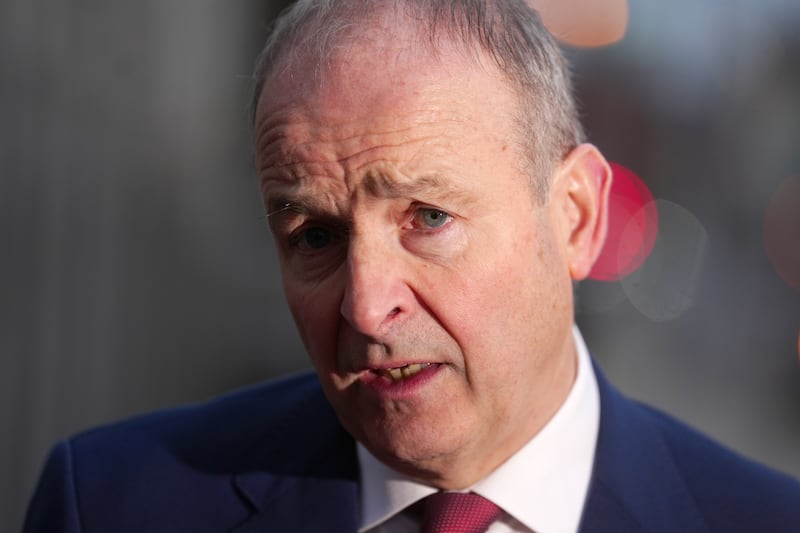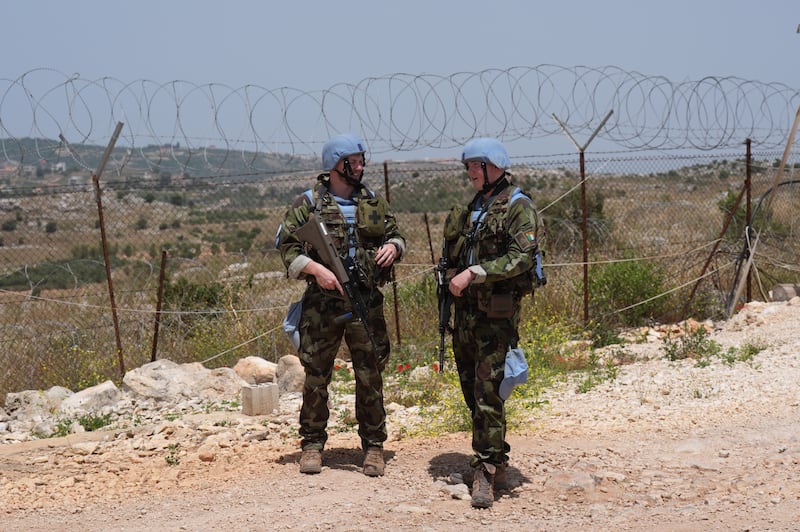The possibility of Ireland sending peacekeepers to Ukraine was mooted this week by Taoiseach Micheál Martin during an emergency meeting of EU leaders.
The meeting came as the United States and Russia started negotiations aimed at ending the war, effectively sidelining Ukraine and Europe. The prospects for peace are far from certain.
US president Donald Trump and Ukrainian president Volodymyr Zelenskiy are openly at odds as Trump blamed Ukraine for starting the war that was, in reality, caused by a full-scale Russian invasion in February 2022. The anniversary of Moscow’s aggressive action against its neighbour falls on Monday.
Russia has insisted that the deployment of Nato troops in Ukraine, even if operating under a different flag, is unacceptable. Trump has said he would not oppose European countries sending peacekeeping troops.
But should a ceasefire occur, how could Irish troops end up being deployed and what are the politics around all of this?
Prof Ben Tonra of UCD’s School of Politics and International Relations highlighted suggestions from London and Paris that European troops could be deployed to Ukraine away from the frontline as part of a security guarantee. Under the tentative proposals this would be backed by European and US air cover.
“In those circumstances I think the Irish Defence Forces would be capable of making a contribution,” said Tonra. “But it would be pushing them to the pin of their collar,” he added, citing current numbers and equipment levels.
[ Should Ireland revisit its neutrality? Prof Ben Tonra and Dr Raymond Murphy debateOpens in new window ]
The Defence Forces is currently below its target strength in terms of personnel and lacks several capabilities common in similar-sized European countries. The Government has committed to significantly increasing investment, though this will take time.
Tonra pointed out that Ireland has not been politically neutral when it comes to the war in Ukraine, even if it maintains a stance of military neutrality. The Government has been consistently outspoken in its condemnation of the Russian invasion and in its support for Ukraine, backed with pledges of non-lethal military aid and humanitarian support.
“I don’t think Ireland’s non-membership of Nato is going to provide any added incentive for [Russian President Vladimir] Putin to have Irish troops as opposed to anybody else’s,” said Tonra.
He suggested troops from China or India could be Putin’s preference.
Any Irish contribution would likely be small, said Independent Senator and security analyst Tom Clonan.
“Unfortunately the Defence Forces are in crisis at the moment through no fault of their own. It’s lack of investment,” he said. Personnel numbers were “on the floor” and “they have a lot of commitments both domestically and overseas”.
Clonan’s guess would be that any soldiers sent would be involved in bomb disposal and demining and training others to carry out such duties. As for the politics of any deployment, there is huge sensitivity around anything that would appear to impinge on Irish military neutrality.
[ Ireland’s neutrality is widely regarded as absurd and complacentOpens in new window ]
At Wednesday’s meeting of EU leaders, the Taoiseach signalled that Ireland would consider providing peacekeepers in Ukraine in the event of a ceasefire deal being struck with an international mandate. A Government source said Ireland would not participate in a deterrence force.
 Taoiseach Micheál Martin has signalled that Ireland would consider providing peacekeepers in Ukraine under certain circumstances. Photograph: Brian Lawless/PA
Taoiseach Micheál Martin has signalled that Ireland would consider providing peacekeepers in Ukraine under certain circumstances. Photograph: Brian Lawless/PA
The Irish Times understands that the ceasefire would have to be concluded on United Nations principles.
If there is a need for the ceasefire to be monitored – in a similar way to the current Defence Forces mission in Lebanon – Ireland would consider participation.
Under the current triple lock system, 12 or more Defence Forces troops cannot be deployed on an active overseas mission without approval from the Dáil, the Government and the United Nations.
The five permanent UN Security Council members – the US, UK, Russia, China and France – effectively have a veto over any deployment, meaning many proposed UN missions never get out of the planning stages.
During the last Government the Department of Defence was instructed to prepare legislation removing the requirement here for UN approval for Irish deployments. The new Coalition Government of Fianna Fáil and Fine Gael (with the support of seven Independents) has committed to reforming the triple-lock legislation while ensuring that any charges “are in keeping with our values and policy of active military neutrality”.
[ Carroll-MacNeill backs US senator’s call for Ireland to increase spending on defenceOpens in new window ]
The Department of Defence said the draft heads – or outline – of legislation have been prepared “with a view to proposals being brought to Government in due course amending how Ireland deploys its troops overseas” for peacekeeping, crisis management evacuations and other matters.
Opposition figures who spoke to The Irish Times were open to Irish peacekeepers going to Ukraine, provided it was under the triple-lock rule, which they were strongly opposed to scrapping.
Sinn Féin defence spokesman Donnchadh Ó Laoghaire said the triple lock ensured Irish deployments overseas were “UN peacekeeping missions” and that it “safeguards for our neutral status”. He said his party would not support legislation undermining this.
Sinéad Gibney, defence spokeswoman for the Social Democrats, said the triple lock was “integral” to neutrality and a potential deployment of peacekeepers to Ukraine “emphasises the whole point and purpose of the triple lock”.
Galway West Independent TD Catherine Connolly said she believed the Government’s proposed changes to the triple lock followed a “choreographed campaign” over a number of years which “constitutes a grave undermining of the UN and its values”.
Richard Boyd Barrett of People Before Profit accused the Government of trying to use “the crisis in Ukraine as an excuse to try to undermine Irish neutrality and move us closer to Nato and EU militarisation”.
 Irish soldiers with the Unifil peacekeeping force in southern Lebanon last year
Irish soldiers with the Unifil peacekeeping force in southern Lebanon last year
Senior Government figures have consistently denied that there is any such intention amid the debate over the future of the triple lock over the last 18 months. In November 2023, Martin, who was then tánaiste, announced plans to scrap the triple lock while insisting the Government had no intention of taking steps towards Nato membership or altering its policy of military neutrality.
“That is simply not on the agenda,” he said.
On Thursday Minister of State for European Affairs and Defence Thomas Byrne told RTÉ that, under the proposed changes to the triple lock, “the Dáil and the Government would approve any peacekeeping mission that we’d have and it should be under the principles of the UN Charter.
“We wouldn’t be allowing the Security Council to have veto on any proposals about Irish peacekeepers,” he said, adding that the triple lock is the law “as it currently stands”.
Byrne said the involvement of Irish troops in Ukraine is “all entirely hypothetical” as “there is no peace to keep or no peace to enforce or maintain”.
Ukraine was currently a war zone and “Ireland does not engage in wars”, said the Fianna Fáil junior minister.
For now, any deployment of Irish troops is purely hypothetical given the massive uncertainty on how the fledgling and highly controversial peace talks will pan out.
John O’Brennan, professor of European politics at Maynooth University, said he was “really sceptical” about whether a peace deal would be achieved at all. He suggested Ukraine’s strategy would be to win the war with increased support from Europe in the form of funding and military equipment.
[ Ireland’s lack of security strategy ‘indefensible’, veteran Garda intelligence officer saysOpens in new window ]
“There’s a lot of volatility in geopolitics in Europe right now”, and the comments by Trump and others in his administration have “caused a storm and created lots of different conversations about what a post-conflict settlement might look like in Ukraine”, said O’Brennan.
There’s “no way on earth” that Ukraine would agree to the kinds of measures being suggested by the United States, he said.
“I don‘t see really any circumstances in which we’re going to see or require European troops, boots on the ground in Ukraine,” he said. “And I don’t think the Russians would ever agree to that either.”
Source link : http://www.bing.com/news/apiclick.aspx?ref=FexRss&aid=&tid=67badb8011734fcf966f83a879ed3fa4&url=https%3A%2F%2Fwww.irishtimes.com%2Fireland%2F2025%2F02%2F23%2Fcould-irish-peacekeepers-end-up-in-ukraine-if-the-eu-is-drawn-in-to-protect-a-ceasefire%2F&c=14637808876428568124&mkt=de-de
Author :
Publish date : 2025-02-22 22:00:00
Copyright for syndicated content belongs to the linked Source.



